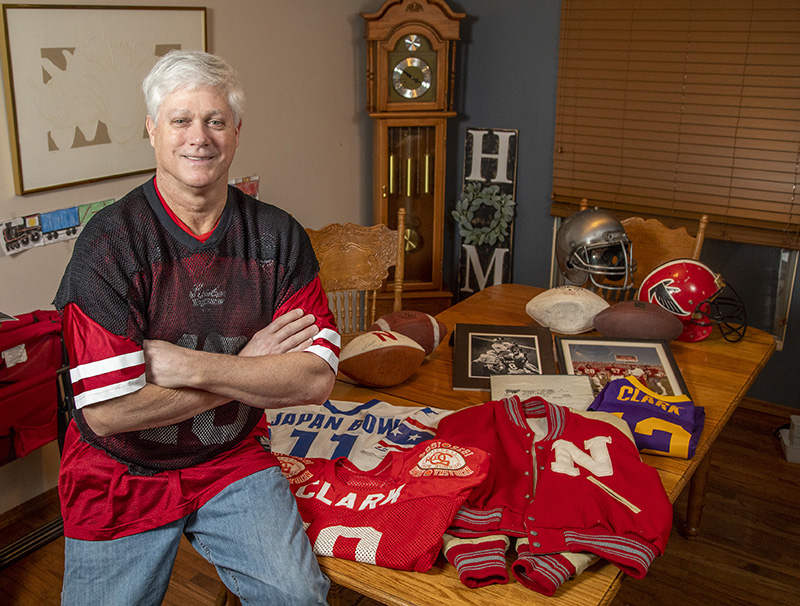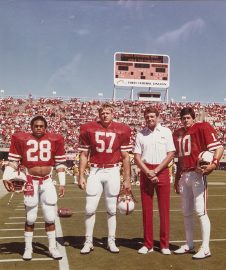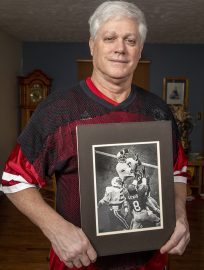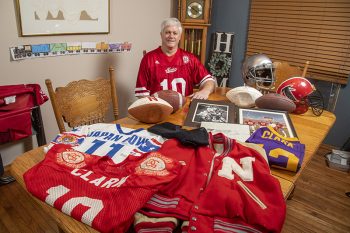Former Husker, NFL player builds a post-football career at OPPD

Before he worked at OPPD, teaching others how to generate electricity for thousands of Nebraskans, Bret Clark tackled NFL legend Walter Payton and intercepted Joe Montana.
Clark lived the dream of countless Nebraska high school football players with a career that took him to the Huskers, the Tampa Bay Bandits and the Atlanta Falcons. He became an All-American in 1984 as a safety for Nebraska, leading the team in interceptions for three straight years. And he faced some of the greatest NFL players of the 1980s before returning home to Nebraska and, eventually, a job at OPPD’s Nebraska City Station.
“It was a thrill,” said Clark, a senior instructional technician. “You’re playing against guys you idolized in high school. You’re in awe of the situation, but you’ve really got to focus.”
As Nebraskans prepare to watch the Super Bowl, the 62-year-old looks back with pride on a career that took him to the highest levels of the sport, followed by a less visible but essential job serving the community with reliable, affordable power.
Football-focused as a kid
Even as a child, Clark sensed he might one day make it to the NFL. At 10 years old, he’d play tackle football – and hold his own – against 16-year-olds.
“Whatever it was – football, basketball, track, golf, tennis, baseball, you name it – you wanted Bret on your team,” said Scott Porter, a longtime friend who played football with Clark at Nebraska. “He could do it all.”
Clark’s hometown, Nebraska City, had a strong bench of scrappy, competitive, athletic kids who fed off one another. His father, a local shop teacher and head football and track coach, immersed him in the sport early and laid the foundation for many other talented Nebraska City teams.
“I just had this gut feeling that I could be out there doing it,” Clark said. “I’d play with the older kids, and yeah, they’d beat me up a little bit. But it just made me tougher.”
On the Nebraska City Pioneers football team, Clark played wherever he was needed — quarterback, defensive back, running back, receiver. He was fast for his age, running a 4.64-second 40-yard dash, enough to catch the attention of University of Nebraska recruiters. Coach Tom Osborne offered him a scholarship.
“It still gives me goosebumps thinking about it,” he said. “In high school, I had Oklahoma and Missouri and UCLA and some other big schools contact me, but I wanted to go to Nebraska. I didn’t want to go anywhere else. I told my coach at the time, if anyone calls and asks about me, just tell them I’ve already made my decision.”
Playing for the Huskers

Clark joined the university’s freshman team, which at the time had its own coaching staff. His first game against Oklahoma State, he caught a few interceptions and snatched a fumble.
His coaches were impressed and moved him up to practice with the varsity team. The team red-shirted him the next year, allowing him to practice and lift weights but sit out games so he could have an extra year of eligibility.
Clark played his first varsity game as a redshirt sophomore and quickly stood out, leading the team in interceptions for three years straight.
Osborne remembers Clark as a natural leader and a strong tackler, with the size and speed to defend against passes effectively.
“Bret was a great safety for us,” Osborne said. “His performance was always very consistent, and he was someone you could count on to get the secondary lined up correctly.”
A close game
The year was 1983. The final seconds of Nebraska vs. Oklahoma State down in Stillwater. Nebraska was undefeated, ranked No. 1 in the division, and had steamrolled all its rivals in the season’s first five games.
But not this time. With seconds to go, Nebraska clung to an uncomfortably close 14-10 lead. The Cowboys had the ball and one last chance to score a touchdown.
Ike Jackson, an Oklahoma State quarterback, started the run at Nebraska’s 47-yard line. Jackson darted sideways along the Husker defensive line, tailed by two Nebraska players. As the clock ran out, he lobbed the ball toward a Cowboy receiver in the end zone.
Television announcers gave the play-by-play.

“He throws it, it’s up for grabs. It could be anybody’s… and Nebraska gets it! Nebraska intercepts! The game is over, ladies and gentleman. It was a super game. Bret Clark makes the interception right at the end.”
The next day, a photo in the Lincoln Journal Star showed Clark leaping up to catch the ball, with two Oklahoma receivers plowing into his ribs. That play saved Nebraska from an embarrassing loss.
What made the moment truly memorable, though, was a man in the stands.
Clark had assumed his father wasn’t there. His parents had always supported him, shaped who he was. Before he qualified for a scholarship, they had sacrificed and saved just so they could send him to college. His father had left his teaching career for a better-paying job at an asphalt company. His mother worked just as hard at a local grocery store. When he told them about his scholarship, it was as if the whole family had won.
But Clark didn’t think they would make it to that particular game. He didn’t know that, at the last minute, a family friend with access to an airplane had flown his father down to Stillwater.
“I look over, and my dad is jumping out of the stands,” Clark said. “He got to see the whole thing, and he came down to the field to congratulate me. That was really special.”
Staying focused
Other college moments were funny, and a reminder to never lose focus.
Later than year, the Huskers were soundly beating Iowa State in Ames. A miserable November cold swept through the stadium, with wind chills of 28 degrees below zero. Clark was on the bench, shivering under a blanket, when Jeff Smith, a Nebraska I-back, ran 70 yards for another touchdown. The Huskers’ kickoff team was up, and Clark had to take the field.
“I was so stiff, I could hardly walk,” he recalled.
As a safety, Clark was supposed to run 10 yards down the field during the kickoff and then move to the middle, slow down and read the situation. Right away, he could see that the ball was going to fly well into the end zone, so he jogged back toward the blanket waiting for him on the sideline.
The next day, watching game film with the team, Coach Osborne noticed that Clark had run off the field early.
“Bret, what are you doing here?” Clark recalled Osborne asking. “It doesn’t look like you’re playing your responsibility.”
Clark shrugged. “Coach, I was cold.”
Osborne, calm as always, paused. “Well, Bret, I think you’re going to be doing a little extra running after practice today.”
Joining the NFL
Clark started at Nebraska for three years straight, and lost only four games. He missed just four tackles with the Huskers out of more than 200. His only disappointment: Never winning a national championship.
He entered the NFL draft in 1985, his senior year. The Los Angeles Raiders picked him in the seventh round, but Clark chose to accept a much more lucrative, $2.1 million contract with the Tampa Bay Bandits in the United States Football League.
Clark played seven games, but a dispute over back pay led him into arbitration with the team. The fledgling league folded shortly thereafter, and Clark never received all the money he was owed. Bad investment advice would later cost him much of what he had earned.

But the NFL still wanted him. In the 1986 NFL draft, the Atlanta Falcons traded their fourth-round pick to the Raiders for the rights to Clark.
Tough lessons followed. NFL players were faster than Clark imagined, the game more intense. His speed and strength weren’t enough.
“The only way I’m going to make this team is to be smarter than everyone else in my position,” he told himself.
Back to studying
So at night, after all the team workouts and meetings, Clark studied his playbook. He memorized what every defensive back was supposed to do.
The extra work paid off. During practices and games, some teammates would occasionally freeze. Clark could tell them where to go, and the coaching staff noticed. Before long, he moved up the depth chart.
As a starting safety for the Falcons, Clark played with and against many of his high school heroes. Billy “White Shoes” Johnson was a teammate. He faced the great John Elway. Intercepted Joe Montana. Picked off Dan Marino. Tackled Walter Payton.
“When you’re out there, you’ve got to think that you’re just as good as they are,” Clark said. “For me, that hard at the beginning, because you idolize those guys. But if you don’t, they’re going to tear you apart.”
‘Movin’ On’
Clark continued to grow in his career until 1988. Three years earlier, he had injured his knee playing basketball. Now, it started to swell. Team doctors with the Falcons drained it before every game, but soon, his knee cartilage had worn away. Clark worked out with the team, but couldn’t play. The Falcons released him.
The Kansas City Chiefs let him try out for their squad – the team doctor, a fellow Nebraskan, reluctantly cleared him for practice – but the owners decided not to take the chance. His football career was over.
Clark considered his options. He had earned a parks and recreation management degree from the University of Nebraska, but the best jobs in that field were out in western states. He and his wife, Tammy, wanted to go home. They moved to Lincoln, to a quiet cul-de-sac where they raised their daughter and two sons. Later, he wrote a book about his life in football: “Movin’ On: My Life in the NFL.”
A friend who worked as a manager at the Nebraska State Penitentiary’s boiler plant suggested Clark apply there. Clark returned to school, earning a boiler maintenance degree from Southeast Community College, and found work maintaining Nebraska Wesleyan’s boiler in Lincoln.
Nine months later, a job came open at the prison. Clark was hired. He took welding and electrical classes, improving his skills just as he had on the football field.
A new home at OPPD
Years passed. Clark started to think about OPPD’s Nebraska City Station. The plant offered well-paying jobs and had employed many of his friends and acquaintances.
Finally, he scored an entry-level job as a helper. Slowly, with more experience and study, he rose to a higher-level position. Then another. And another.
Clark became an assistant equipment operator, an equipment operator, an assistant unit operator, and a unit operator. Eventually, he gained so much experience that he took a job training others as a senior instructional technician.
Now, Clark juggles work and caring for Tammy, who has faced some health problems. His daughter, Danielle, grew up to become a gifted swimmer. One son, Tyson, was a Nebraska walk-on who later transferred to Wayne State University as a tight end. His other son, Taylor, was a Wayne State linebacker.
Longtime friends describe Clark as humble, generous and devoted to family.
“Bret is one of the greatest athletes I’ve ever met, but he’s an even better man,” said Greg Orton, who grew up with Clark in Nebraska City, played with him for the Huskers, and spent a year in the NFL himself. “He’d give you the shirt off his back. He’s just so humble, and such a genuinely nice person.”
Clark credits his success at OPPD to many of the lessons he gleaned from football: Attention to detail. Studying on your own. And, of course, teamwork.
“Learning everything I needed to know at the power plant didn’t come naturally to me,” he said. “It took a lot of extra effort. But everyone down here helped explain things to me. That’s what’s nice about working here. People are very generous with their knowledge. It’s so similar to when I was playing at Nebraska. You always have someone willing to help you out.”

Grant Schulte joined OPPD as a content generalist in 2022. He is a former reporter for The Associated Press, where he covered the Nebraska Legislature, state politics and other news for a global audience. He is a graduate of the University of Iowa and a proud Hawkeye. In his free time he enjoys running, reading, spending time with his wife, and all things aviation.
View all posts by Grant Schulte >


